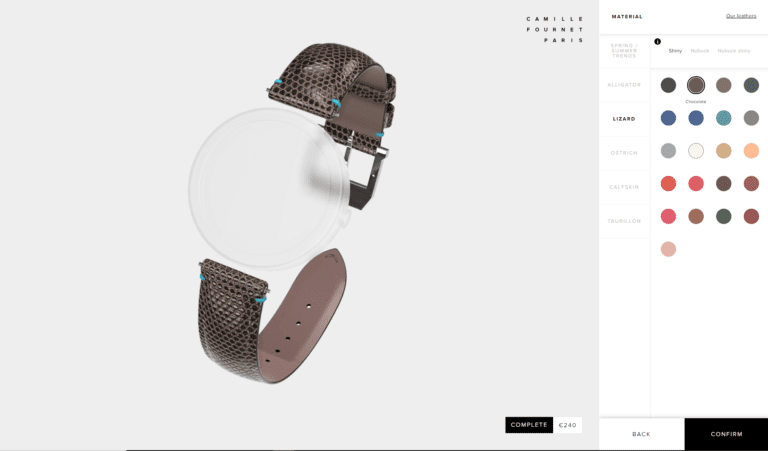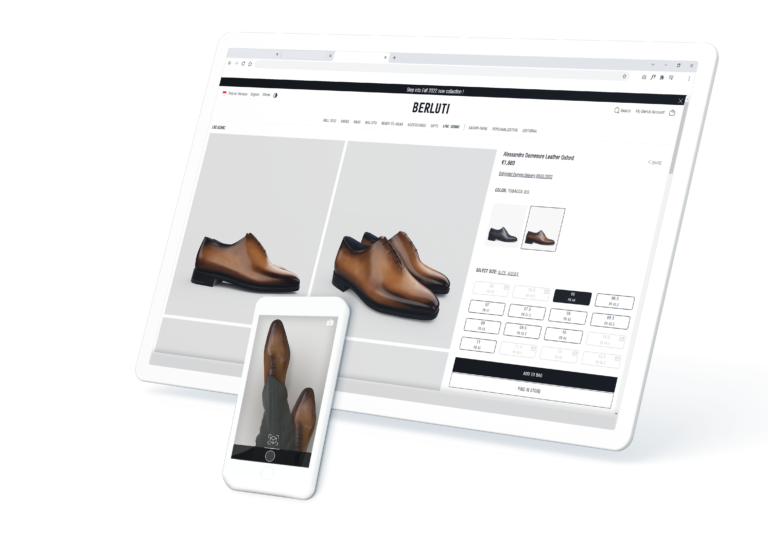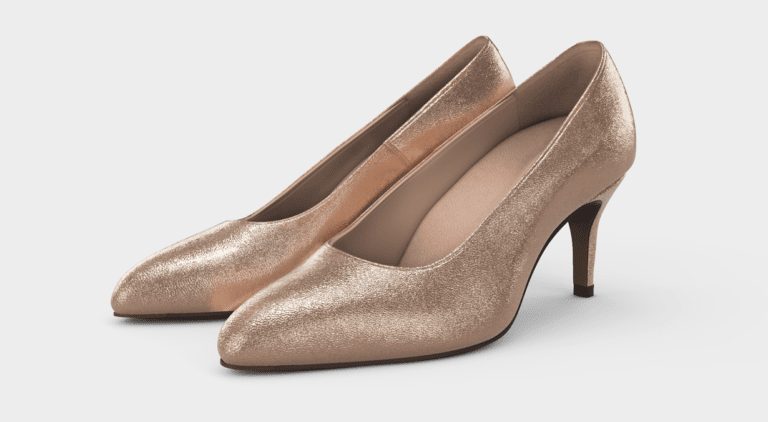The importance of 3D configurators for customer experience in the luxury industry
The importance of 3D configurators for customer experience in the luxury industry Table of Contents In the luxury industry, where attention to detail, exclusivity, and

Visual commerce is a widespread strategy where brands exploit the power of visual content, 3D renderings, and augmented reality to catch, interact and reassure prospective customers. Thanks to the power of 3D technology, visual commerce elevates standard product images that people await when visiting an e-commerce website.
Consumers’ way of making decisions while shopping is gradually changing. Brands are increasingly using 3D content, Augmented Reality, and virtual-try-on filters to create visual commerce experiences.
Attracting potential clients with traditional photography and static images is no longer effective. To continue enticing customers to make purchases, e-retailers should adopt user-engagement strategies and technologies.
There are several examples of how online retailers can exploit visual commerce. However, the three most advantageous to eCommerce brands are virtual photography, augmented reality solutions, and visual configuration.
3D real-time product configurator for a FURLA bag
Virtual photography (also called 3D product imaging) consists of the procedure of generating real-world visuals, but is created by exploiting 3D technology. The final result is a 3D virtual product that looks like a high-quality photoshoot, but that viewers can interact with.
These interactions help consumers see what the final product will look like before they buy it. This includes zooming in and out, rotating the viewing angle, and changing the color combination.
Virtual photography is a cutting-edge and increasingly important tool for building consumer trust and converting sales. Research highlighted that from 2020 to 2021, online product returns increased by 56% [1]. One of the main reasons was represented by the divergence between how the product looked online, compared to real life.
With regard to traditional photography, 3D product photography has several benefits. For example, it helps save time. Companies can exhibit their complete product collection using 3D models, reducing photo shooting and project completion dates.
Furthermore, virtual photography allows displaying several variations of the same product. 3D technology allows for an infinite number of options of an item to be produced, without the need for constant restaging.

Augmented Reality allows users to visualize 3D versions of physical elements, in their own real-world environment. It has been proved as one of the main benefits of eCommerce compared to brick-and-mortar stores.
Brands can create a unique customer experience in Augmented Reality by leveraging our 3D glTF file format, increasing consumer engagement and decreasing returns. In fact, 71% of consumers reported they would shop more frequently if they could use AR [2].
The innovative technology behind AR allows users to immerse themselves in a 360° shopping experience from the start. 3D renderings in AR allow users to see how a product would look in their homes or on their own clothes. This is a great way to try out products before you buy them.
By emphasizing your Augmented Reality experience, SmartPixels can help your brand stand out. 3D configuration software will allow your clients to see 3D visuals, personalize them, and envision them in their space using AR. Following the implementation of Augmented Reality solutions for our clients, they saw an increase in consumer engagement and sales.
3D real-time web product configurator realized by SmartPixels for Globe-Trotter
Customer can configure design details for complex products in real-time using visual configuration. It replaces flat photos with 3D visualizations, allowing customers to see how their product will appear from every angle.
This allows the customer to participate in the design process and makes them feel more connected to their beloved products.
3D visuals generated with virtual photography can be used for a variety of purposes. Our clients expressed their major interest in 3D web configurators. Our team can integrate 3D renderings of various product combinations directly onto our clients’ websites.
End customers will be able to make instant changes to product combinations in order to customize them according to their tastes. 3D web product configurators drastically reduce barriers to purchase.
Product visualization supports shoppers to make optimal real-time purchase decisions. Moreover, image interactions boost the time spent on a website and, as a consequence, conversions.

E-commerce is on the rise. To illustrate, e-commerce sales are expected to reach 21.8% of total sales from now to 2024 [3].
Therefore, brands will need to be able to demonstrate the key features of their items and assist clients in visualizing them without the possibility to physically touch or feel them.
Consequently, one of the main benefits of visual commerce is its ability to get e-commerce brands closer to their clients.
Using 3D technologies for visual e-commerce can help create an online shopping experience that is just as engaging as in-store shopping. Visual commerce allows bridging that gap while also creating engaging ways for customers to connect with products, improving the overall shopping experience.
Brands exploit SmartPixels’ technology to create and manage stunning high-resolution 3D visuals and Augmented Reality solutions at scale.
Don’t hesitate to contact us to learn more about how our 3D visual technology can help you convert customers!
*Sources:
[1] https://www.cnbc.com/2022/01/25/retailers-average-return-rate-jumps-to-16point6percent-as-online-sales-grow-.html
[2] https://www.eclipsegroup.co.uk/wp-content/uploads/2020/06/The-Impact-of-Augmented-Reality-on-Retail.pdf
[3] https://www.drip.com/blog/e-commerce-statistics#:~:text=In%202020%2C%20e%2Dcommerce%20sales,of%20all%20retail%20sales%20worldwide.&text=Notice%20the%20big%20jump%20from,and%2021.8%20percent%20in%202024.
The importance of 3D configurators for customer experience in the luxury industry Table of Contents In the luxury industry, where attention to detail, exclusivity, and
3D rendering vs 2D: what are the benefits of one over the other? Table of Contents 3D rendering offers a significant leap in realism compared
How do 3D product configurators reduce e-commerce returns? Table of Contents Overview of e-commerce product returns % of people who claim to retunr their online
Omnichannel strategy: the keys to a successful experience Chloé Tokyo store with a personalization experience created by SmartPixels The global pandemic has forced brands around
How AR helps luxury brands to build immersive experiences What is Augmented Reality? Augmented Reality solution by SmartPixels Augmented Reality is a technology that enables
Deep-dive into glTF file format During recent years, the glTF file format has gained more and more prominence, due to its functionality and the wide variety